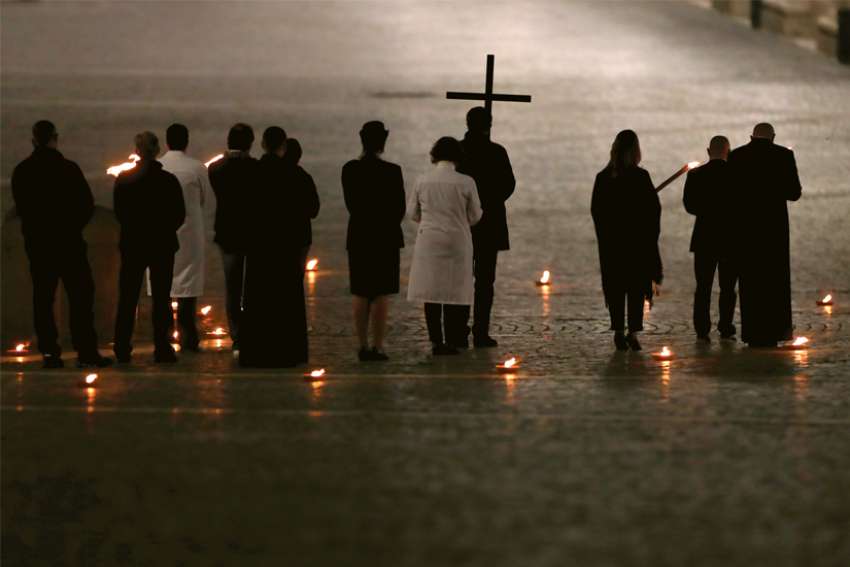Easter has come. What now? Is it just extended Lent as we continue in our little matrix cells? What do we hope for — a return to the way we were before Lent? Is Easter about coping with discomfort, becoming optimists and waiting till the crisis goes away? Was it worth the crucifixion for that?
Not to give us new coping strategies did God, our God before the ages, empty Himself by becoming a little child, being suspended on a cross, entering a narrow tomb, descending into hell and breaking its gates asunder. Out of death God brings life. Out of nothingness, God brings everything into being.
This is not a wish-fulfilment, but a witness of the way things are. A young man taught me so, not a bright-and-rising university student but a marginalized man who’d suffered mental illness and lived much of his life in shelters.
André was one of the people with whom I travelled to a poverty-stricken orphanage in Eastern Europe. One day, I was having a tough time, homesick and unhappy. Only André, of all the people there, saw my face. He asked what the trouble was. I shook my head, unable to speak. To which he said, gently: “Share your sadness.” His kind insistence enabled me to come out of myself and share (as it turned out) sadness yes, but even more, joy and hope.
How did he know? Because he knew what it meant to be counted as nothing.
The most vulnerable, the forgotten, lead us. We don’t lead them. They know, as we all must discover, that we are really nothing — and that for each of us, in our nothingness, God has poured out everything.
That is the tension in which we live our Easter. My prayer is that our shared experience of humanity’s sickness can open us to the truth that we are nothing — any of us can be snuffed out in an instant, as the world’s poor daily experience — but each of us, uniquely, lovingly, without exception and without distinction, is given all there is.
Fortunately, the Easter season doesn’t end when the last chocolate bunny is eaten. During the 40-day lectionary, we hear that Easter is given and given again. One word, one telling, one event isn’t enough. It breaks in, and in again, even as the disciples keep missing it, dazed in the belief that they have lost everything and become nothing. Jesus keeps giving them yet another chance to get it. At Emmaus (Luke 24), finally their eyes are opened and they see what was already inside and all around them, no longer in fragmented bits but the whole tapestry in its beauty. Later, in the upper room, Jesus succeeds in breaking through their troubled minds to open the reality of the Resurrection and its meaning for them.
Easter is not a spring cleaning that restores order. Easter is a shattering experience. It’s the way joy reworks us from within and breaks out among us — just as the divine life in Jesus somehow, in a way hidden to our curiosity, blew out that great stone that sealed shut the tomb. It’s the true Big Bang that recreates creation from within each of us.
Here are two places I saw this transformation before my eyes this unusual year.
In the Vatican’s Good Friday stations of the cross, I saw the light lit into darkness. Not only the darkness of rain, lockdown, fear and sickness, but the darkness of prison, murder and despair. The 14 stations were written by people involved in prisons — inmates, inmates’ families, victims of crime. Each told their story, not hiding from the horror and anguish, but showing the light already reworking their night-time from within.
Then, in Easter week, I saw the same light moving out into the dark. A young man, missing the Easter Exsultet sung and the lighting of candles, with the help of friends found a way to receive and share the Easter candlelight and watch it grow: a simple but inspiring video where I saw the ancient tradition being received by our young adults in a new way.
How does it happen? How does the Easter light shine out from darkness? How was André able to see me and help me change? His passage through his personal darkness gave him eyes to see in the dark and bring me the light. The poorest and most vulnerable teach us to see.
This year, we all share with the majority of humanity the daily vulnerability that reveals the truth. In our nothingness, we realize the gift of our infinite worth.
(Marrocco can be reached at marrocco7@sympatico.ca)


